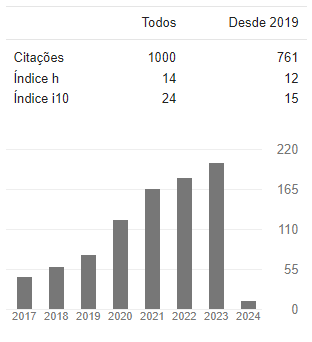Un análisis de los inicios de toma de consciencia de la “resta” de vectores a través de la labor conjunta
DOI:
10.37084/REMATEC.1980-3141.2021.n39.p60-76.id497Palavras-chave:
Profesor experto, Gestos, Labor conjunta, Medios semióticos de objetivaciónResumo
Este artículo presenta el inicio de la toma de consciencia en torno al encuentro con el Saber de la “resta” de vectores por métodos gráficos, que llevan a cabo conjuntamente estudiantes y un profesor experto (20 años de experiencia) en una clase de física de bachillerato. Se trata de un estudio de caso de tipo cualitativo que forma parte de una línea de investigación sobre los modos de enseñanza y que se apoya en la teoría de la objetivación; la cual define al aprendizaje –objetivación– como toma de consciencia. Los resultados muestran, por una parte, la manera en que diferentes elementos semióticos (gestos, signos y artefactos) son movilizados conjuntamente durante la actividad de la “resta” de vectores; y, por otra parte, las dificultades y contradicciones que se producen durante el encuentro con los saberes durante la actividad.
Downloads
Métricas
Referências
BALL, D.; HILL, H.; BASS, H. Knowing mathematics for teaching. Who knows mathematics well enough to teach third grade, and how can we decide? American Educator p. 14-46, 2005.
BERLINER, D. C. Describing the Behavior and Documenting the Accomplishments of Expert Teachers. Bulletin of Science, Technology & Society, 24(3), p. 200-212, 2004. https://doi.org/10.1177/0270467604265535. DOI: https://doi.org/10.1177/0270467604265535
BROUSSEAU, G. Theory of Didactical Situations in Mathematics. (N. Balacheff; M. Cooper; R. Sutherland; S. Warfield, Trads.). London, Great Britain: Kluwer, 1997.
CARRILLO-YAÑEZ, J.; CLIMET, N.; MONTES, M.; CONTRERAS, L. C.; FLORES-MEDRANO, E.; ESCUDERO-ÁVILA, D. V.; ROJAS, N.; FLORES, P.; AGUILAR-GONZÁLEZ, Á.; RIBEIRO, M.; MUÑOZ-CATALÁN, M. C. The mathematics teacher 's specialised knowledge (MTSK) model. Research in Mathematics Education, 20(3), 236-253, 2018. https://doi.org/10.1080/14794802.2018.1479981. DOI: https://doi.org/10.1080/14794802.2018.1479981
CASTRO GARZÓN, D. Análisis de las decisiones del profesor de matemáticas en su gestión de aula. Educación Matemática, 29(3), p. 131-160, 2017. DOI: https://doi.org/10.24844/EM2903.05
D’AMORE, B.; RADFORD, L. Enseñanza y aprendizaje de las matemáticas: problemas semióticos, epistemológicos y prácticos. Bogotá, Colombia: Universidad Distrital Francisco José de Caldas, 2017.
HERSANT, M.; PERRIN-GLORIAN, M. J. Characterization of an ordinary teaching practice with the help of the theory of Didactic Situations. Educational Studies in Mathematics, 59(1-2), p. 113-151, 2005. DOI: https://doi.org/10.1007/s10649-005-2183-z
RADFORD, L. Gestures, speech, and the sprouting of signs. Mathematical Thinking and Learning, 5(1), p. 37-70, 2003. DOI: https://doi.org/10.1207/S15327833MTL0501_02
RADFORD, L. Connecting theories in mathematics education: challenges and possibilities. ZDM - Mathematics Education 40(2), 317-327, 2008. https://doi.org/10.1007/s11858-008-0090-3 DOI: https://doi.org/10.1007/s11858-008-0090-3
RADFORD, L. Three key concepts of the theory of objectification: knowledge, knowing, and learning. Journal of Research in Mathematics Education, 2(1), 7-44, 2013.
RADFORD, L. De la teoría de la objetivación. Revista Latinoamericana de Etnomatemática, 7(2). 132-150, 2014a.
RADFORD, L. On teachers and students: An ethical cultural-historical perspective. In Liljedahl, P., Nicol, C., Oesterle, S., & Allan, D. (Eds.) Proceedings of the Joint Meeting of PME 38 and PME-NA 36 (Plenary Conference), Vancouver (PME), Vol. 1, pp. 1-20, 2014b.
RADFORD, L. The theory of objectification and its place among sociocultural research in mathematics education. International Journal for Research in Mathematics Education, 6(2), 187-206, 2016.
RADFORD, L. The Theory of Objectification: A Vygotskian Perspective on Knowing and Becoming in Mathematics Teaching and Learning. Netherlands: Brill, 2021. DOI: https://doi.org/10.1163/9789004459663
RADFORD, L.; ROTH, W. M. Intercorporeality and ethical commitment: An activity perspective on classroom interaction. Educational Studies in Mathematics, 77(2-3), 227-245, 2011. DOI: https://doi.org/10.1007/s10649-010-9282-1
SALINAS-HERNÁNDEZ, U. A. 2018. Tesis (Doctorado) – Análisis de la características de los modelos de dos profesores –novato y experto– en torno al concepto de sistema de referencia, a través de la red de teorías: un estudio de caso. Centro de Investigación y de Estudios Avanzados del IPN, Ciudad de México, México.
SALINAS-HERNÁNDEZ, U.; MIRANDA, I. La teoría de la objetivación en el análisis de los modos de enseñanza: el caso de un profesor novato. RECME - Revista Colombiana De Matemática Educativa, 5(2), 83-91, 2020.
SCHOENFELD, A. Toward a theory of teaching-in-context. Issues in Education, 4(1), 1-94, 1998. DOI: https://doi.org/10.1016/S1080-9724(99)80076-7
SCHOENFELD, A. Classroom observations in theory and practice. ZDM Mathematics Education, 47, 607-621, 2013. DOI: https://doi.org/10.1007/s11858-012-0483-1
Downloads
Publicado
- Visualizações do Artigo 219
- PDF downloads: 68







 Português (Brasil)
Português (Brasil)
 Español (España)
Español (España)
 English
English































































